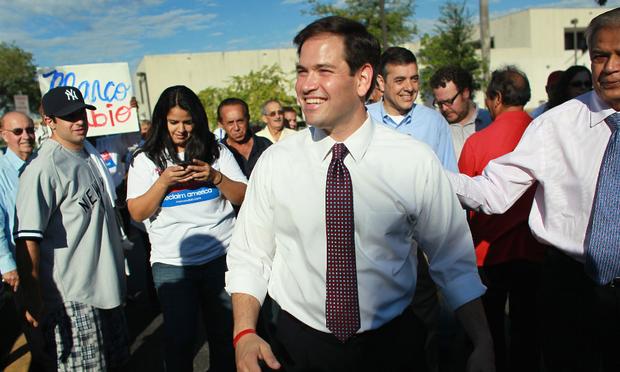In the early 2016 Republican presidential jockeying—as the field of potential candidates grows, and as Jeb Bush , Mitt Romney , Scott Walker and Rand Paul grab the recent headlines—an interesting development is unfolding just beyond the limelight: In the eyes of many in the party, Florida Sen. Marco Rubio has quietly moved into the upper tier of that long list of potential candidates.
He gave a well-reviewed performance at a recent gathering of donors organized by the conservative Koch brothers. He has raised eyebrows by securing the services of Jim Merrill, who directed both of Mitt Romney’s presidential runs in New Hampshire, and the support of George Seay, a Texas financier who raised money for then-Texas Gov. Rick Perry last time around. He has laid a substantive groundwork with a series of detailed policy speeches over the past year.
More intriguing, perhaps, there is little indication that the likely entry of Mr. Bush, the man seen as Mr. Rubio’s political mentor, is going to deter him from proceeding. Over the weekend, Mr. Rubio happened to be in Iowa, home of the nation’s initial nominating caucuses, signing copies of what looks an awful lot like a campaign book of policy ideas. In the next week he’s off to the early-primary states of New Hampshire, South Carolina and Nevada to do the same. A springtime presidential announcement seems likely.
All of which raises the question: In a field populated with other senators and an even bigger figure from the state of Florida, what is the case for Marco Rubio?
It starts with the obvious: Mr. Rubio is a bright and articulate politician with the kind of broadly conservative credentials required in the Republican Party circa 2016. And his ability to break out in fluent Spanish in a news conference or a Telemundo interview gives him a chance to reach a Hispanic audience that keeps slipping away from the GOP.
Still, those attributes aren’t sufficient. For Mr. Rubio, success also depends on the magic of political timing—that is, the chance that he has arrived offering precisely what the market happens to be demanding.Read the rest of this op-ed HERE.
If you like what you see, please "Like" us on Facebook either here or here. Please follow us on Twitter here.






No comments:
Post a Comment